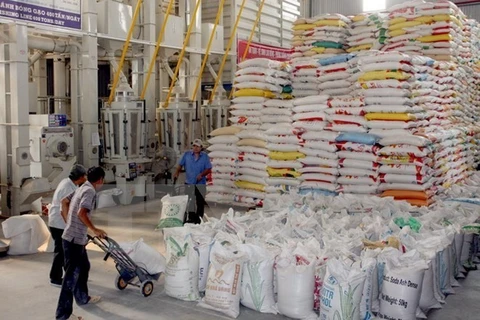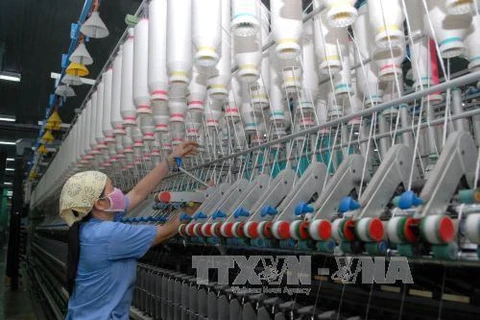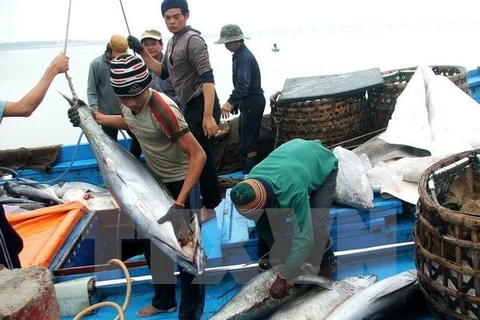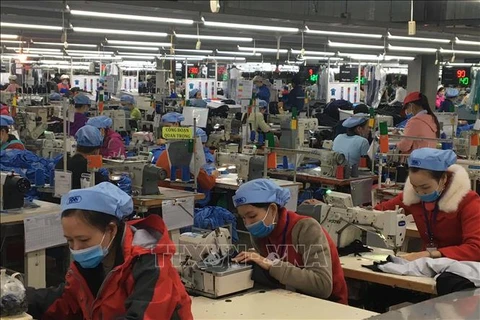Hanoi (VNA) – Vietnam’s agro-fishery export to its most important market – China – has experienced sluggish growth over the recent past.
 Minister of Industry and Trade Tran Tuan Anh speaks at a conference on promoting agro-fishery export to China (Photo: VietnamPlus)
Minister of Industry and Trade Tran Tuan Anh speaks at a conference on promoting agro-fishery export to China (Photo: VietnamPlus) The export of agro-fishery products that are among Vietnam’s major export items to some main markets, especially China, has continuously decreased over the past time, heard a conference held by the Ministry of Industry and Trade in Hanoi on September 13.
China – no longer an easy market
Currently, China is Vietnam’s biggest buyer, making up about 27 percent of the country’s total agro-fishery export value and 30 percent of its accumulative export revenue to the market.
According to the Ministry of Agriculture and Rural Development, in 2018, Vietnam’s agro-fishery export to the neighbouring country hit 8.65 billion USD, a drop of 4.26 percent or 384 million USD against the previous year.
It is noteworthy that last year only three groups of staples shipped to China, comprising vegetables and fruits, rubber, and wood and timber products, posted export revenue of more than 1 billion USD, two groups less than in 2017.
In the first seven months of this year, the value of agro-fishery export to China slipped 7.9 percent compared with the corresponding time last year.
Agro-forestry-fishery export to China is forecast to further slide, even higher than the rate of 5 percent in the time ahead, said Le Thanh Hoa, deputy head of the Agricultural Product Processing and Market Development Department under the Ministry of Agriculture and Rural Development.
The concern lies with signs of a slowdown in the export of many agricultural products, including those of Vietnam’s strength.
An example is rice whose export value tumbled 67.5 percent in the first seven months of this year.
According to Bui Thi Thanh Tam, General Director of Vietnam Northern Food Corporation (Vinafood 1), the biggest reason is China’s tightening quarantine and food safety regulations and its huge inventory.
Minister of Industry and Trade Tran Tuan Anh said Vietnamese agricultural products have failed to overcome technical barriers, and have been neither produced under production chains nor consumed sustainably.
According to Minister of Agriculture and Rural Development Nguyen Xuan Cuong, from June 1, 2019, China has accepted only staples imported to the country via official channels.
The country has also revamped its management agencies in this regard, he added, urging Vietnamese firms to transform in order to adapt to the new regulations and changes.
Adapting to changes
Anh said China may tighten regulations on product quality and origin, and food safety in the time ahead, and called on the sector to take urgent steps in anticipation of the changes.
He also suggested closer coordination between competent ministries and agencies to seek specific solutions so as to boost export and create a stable market for the agricultural sector.
The Ministries of Industry and Trade, and Agriculture and Rural Development will join hands with other ministries, agencies, associations, businesses and localities to make relevant requirements clear, thus devising a sustainable export strategy, he added.
Le Hoang Anh, head of the Asia-Africa Market Department under the Ministry of Industry and Trade, suggested domestic enterprises pay more attention to the planning of production, which, she said, should be based on the market demand.
She also emphasised the need to step up national trade promotion programmes in China, and set up goods distribution and consumption channels in the market.
Unofficial trade channels should be replaced by official ones in order to reduce legal risks, build brand names, and improve product quality and packaging, the official said.
“Cross-border trade and undocumented transactions must be eliminated and transformed into official trade,” Oanh stressed.
Deputy Director of the Hanoi Department of Industry and Trade Tran Thi Phuong Lan also touched upon solutions to help local farmers learn more about standards and requirements of exports to foreign countries, including China.
Such solutions are expected to help change the mindset and awareness of local farmers and businesses in production, meeting standards set by China, she said./.
























